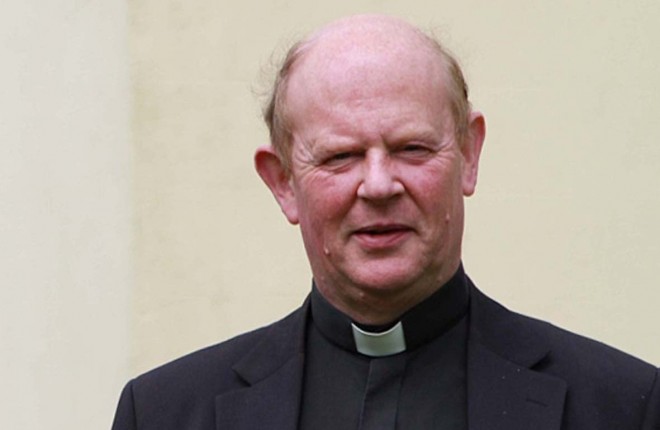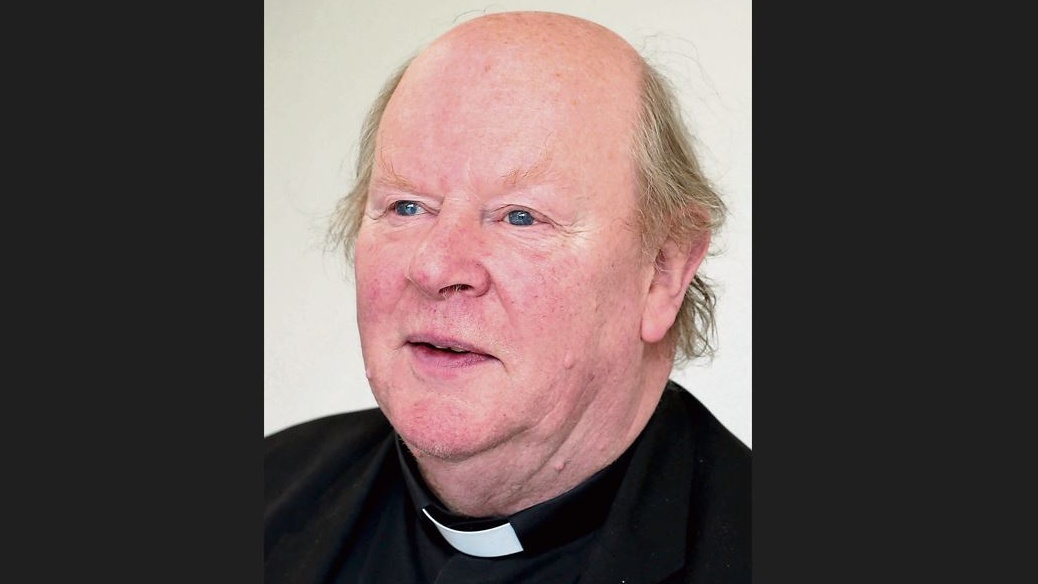Popular Reverend to retire after almost 50 years this weekend
By Evelyn Cullen
WITH almost 50 years under his collar since his ordination in 1977, Reverend Canon David Crooks hangs up his vestments as the longest serving Church of Ireland rector in Killea as well as All Saints since it became a parish in its own right.
With 40 years served in Taughboyne, he is also the third longest serving rector of this area including Craigadooish, All Saints, Newtoncunningham and Killea. The longest is Rector Andrew Hamilton who holds the record of 63 years and Edward Bowen who served for 48 years, “but I won’t catch them now” Canon Crooks said.
So as he prepares for his retirement, what’s he most looking forward to?
“I’m looking forward to enjoying Sunday worship from the pews” he said “and catching up on reading”.
“We have deacons, priests and bishops in the Church of Ireland” he said “the same as the rest of the Church”, the Christian Church as a whole including all denominations, Roman, Anglican, Protestant and Orthodox, who are all united in Jesus Christ and believing in the Trinity. The word Catholic means universal Christian Church so “We are all Catholic” he said.
Reverend Crooks was ordained first a deacon for the parish of Glendermott in Derry in 1977.
The following year he was ordanined as priest in Letterkenny in Conwal Parish Church, where his father, Archdeacon Louis Crooks was rector “for hundreds of years.”
“My father was a great man – as was my Uncle Sammy,” he said, referring to the inimitable Dean Samuel Crooks of Belfast who was “afraid of nothing and no-one, a wonderful character”.
Did they influence his career path into the Holy Orders? “They had a part to play, but I feel that it’s important for anyone who enters the vocation to do so on their own right” he said.
After his training and before coming to Taughboyne in 1984 he had two curacies; the first in the parish of Glendermott in Derry and the second as curate of Old St. Paul’s Church in the centre of Scotland’s capital, Edinburgh, an Anglo-Catholic parish which he describes as having “very high standards of Anglican worship and liturgy”.
As well as hard work he had great fun there and indeed pulls off a convincing Scottish accent, which had us both in giggles, one of many times his playful sense of humour had us laughing and joking.
Another thing he enjoyed about his time in Edinburgh was the view out his window of the trains coming and going from Waverley station in the centre of the city. Railways are one of his passions and he has a great interest in the All Island Rail Review published last month, the national plan to connect the cities of Ireland and bring trains back to Donegal.
He has seen a lot of changes in the Church during his career. “The ordination of women has been a very major development in the Church of Ireland” he said “one which I was opposed to on the grounds that it wasn’t done by the Church as a whole, and as such was a breach of the system” he said. However he applauds the work of excellent women such as Liz Fitzgerald, the first female Dean in the diocese of Derry and Raphoe.
Reverend Crooks is a great lover of music and was a member of the University of Dublin Choral Society, in which capacity he convinced the conductor to bring the choral masterpiece Handel’s Messiah to St. Eunan’s Cathedral in Letterkenny.
In his retirement he is looking forward to having more time to play the organ, though he is modest about his talents, playing them down by saying he “has a go at Bach’s Preludes” but mostly “I amuse myself and nobody else”. The parishoners of Newtoncunningham Church of Ireland, where he plays, might disagree.
He also loves to travel and his work has taken him all around the world including most of Europe, America, Canada, Australia, New Zealand, China, Russia, Uganda, Morocco, India as well as a visit to the city of Mahajanga in Madagascar, where his brother-in-law was bishop for five years, “a place that was so hot the hens were laying fried eggs” he said.

Rev. Canon David Crooks who retire this Sunday morning at a special ceremony in Newtowncunningham Church of Ireland
But he still has lots of travel to do “I’ve never been to Japan, South Africa or South America” he said.
Asked about his achievements he said “that’s for other people to say” but he is very proud of the work of the Newtoncunningham Interchurch Committee, a partnership between the Roman Catholic, Presbyterian and Church of Ireland Churches in that area.
The work includes the establishment of Trinity Court, a day centre with a 34 unit housing development. “It’s an example of real interchurch ecumenism at work, a marvellous success” he said.
He speaks Gaeilge and French as well as German, which he said came in useful during his travels in Eastern Europe before the fall of the Iron Curtain, when “we were arrested over and over again, but we always got away” he said. But that will have to be another story.
He is a published author and has written two books; one on the history of Taughboyne parish (In the Footsteps of St. Baithin) and one about the history of the churches of Derry and Raphoe (Living Stones). He has also been the editor of succession lists, a huge volume of work listing the clergy of various Irish dioceses, which he plans to continue.
As well as regaling us with stories of his long tenure, he ingratiated himself well with our team by saying he is a great fan of the paper, which earned him no less than a free copy.
His retirement ceremony takes place on Sunday in Newtowncunningham Church of Ireland at 11am and will be attended by Bishop Forster of Derry and Raphoe.










